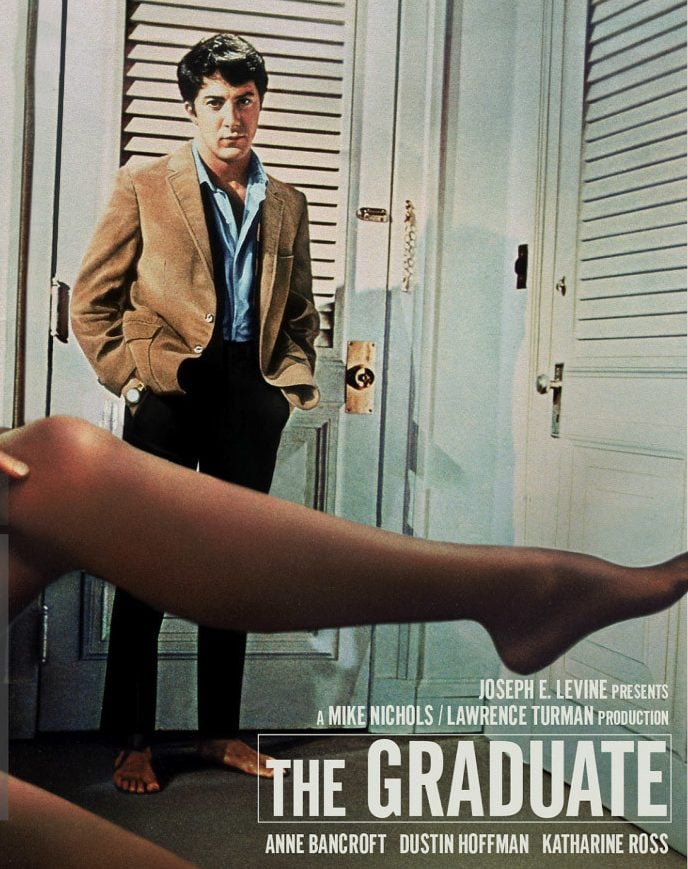From its start, The Graduate shows its audience that Ben is alienated from the older generations. At the party his parents throw to celebrate his graduation from college, he seems aloof and indifferent, in both his physical detachment from the party and the emotional distance he embodies. His university is an invisible but powerful symbol of his youth, with the intellectual and physical vigour of his achievements – cross country, debate – contrasted with his muteness now, in the face of a sea of fawning adults. The university would also by the late sixties become the most recognisable site of an entire generation’s social removal from its elders, in its embrace of sexual freedom and anti-war protest.
It is when relaxing on a floating pool bed that this generational fissure becomes all too clear. The camera angle shows Ben’s father towering over him when he objects to Ben’s slovenly lifestyle and demands aspiration and hard work, or at least movement. In the world of film, movement is an integral part of youth – think Jonah Hill and Michael Cera dancing in the opening credits of Superbad – but Ben seems happy to reject it. In reality, his affair with Mrs. Robinson keeps him moving around nightly. Not only does Ben not participate in the plans of his parents, but he symbolically disrupts that very cabal that overlooks him in the pool. His use of the alter ego Mr. Gladstone at the hotel rejects his parents’ name, and by implication their plans for his life.
Ben is something of an anti-hero. The actions he takes are often far from admirable, while his apathy (for most of the film) detaches him from the chivalric standards celebrated in America’s World War Two veterans. Yet perhaps this is what a disillusioned generation demands. The Graduate portrays in stark terms the removal from the moral compass of previous decades, foreshadowing the social breakdown of the late sixties. The final scene, as Ben and Elaine flee from her wedding, fittingly symbolises the destruction of the most fruitful safeguard of post-war American prosperity and society. The uncertain expressions on the faces of Ben and Elaine at the close of the film, however, make clear that this catharsis remains full of uncertainty.
In this superficial world, Ben seeks meaning and connection, pleading with Mrs. Robinson for some sort of conversation. While Ben’s scuba suit obscures the world around him and distances him from it, his affair represents physical contact that confounds the values of the society. In this act of rebellion, he still seeks some sensibility and good manners, reflecting some youthful optimism that he can make and participate in a different world. But Mrs. Robinson is resigned to the affair as a fleeting transgression: both she and Ben are trapped in unhappy lives in Pasadena, both alienated from a society characterised by aspiration and patriarchy. If Arkady rebels against his father’s provincial gentry origins in Turgenev’s Fathers and Sons, having been inspired by his charismatic university friend Bazarov, Ben’s symbolic rebellion fails because he can’t establish this sort of meaningful relationship outside conventional society with Mrs. Robinson.
His escape with Elaine at the end shows he must commit absolutely to a non-reified life; while he once forced her to confront her own sex’s reification at a strip club, now he sticks the holy cross in the door to prevent the wedding guests from pursuing them. He can’t have his reified cake and eat it: if his rebellion is to work this time, he must detach himself from every symbol and embody that meaning himself. The bus passengers overtly staring at Ben and Elaine demonstrates this shift, with her wedding dress transplanted into the cold soil of de-reified realism. Will it survive? Maybe not – as their uncertain faces betray at the very end – but at least they can now pursue the authentic meaning of the self, distanced from suffocating convention. The essentialist tone which The Graduate strikes at in its conclusion cannot but presage the generational reckoning of the late sixties – and depict perfectly the perennial youthful conflict between confusion and absolutism.


